Yaoundé makes a refreshing stop in Cameroon. Named after its German founder (Jaunde), the capital city spreads along the highway, from the north (presidential palace, embassy district), through the middle (our hotel) to the south (city center).
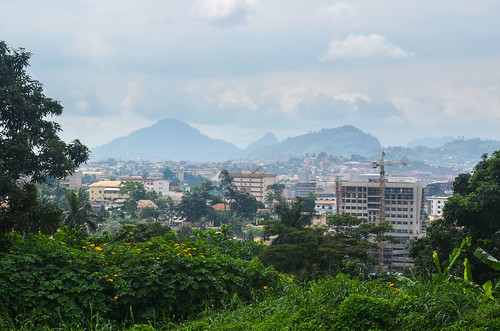
The climate is pleasant as the city is nested in the hills, at around 700 m of elevation. It is far from being flat. We changed our base camp from the Presbyterian mission to a motel where couples don’t stay very long. The first one had no electric sockets in the room, a shared bathroom, a curfew, and so many prohibitions (laundry, guests, “unethical behavior”). The second, twice cheaper, has everything we wanted: we missed electricity and clean clothes. With all the red dust in ours, we really needed to clean everything. I find in general that catholic or protestant missions are overpriced for the services they offer. Their only assets are safety (and this is relative … it is just because religious missions are less likely to be targeted) and location (large park, beautiful church).
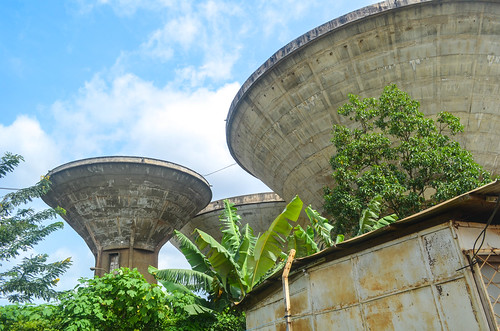
Our priority is the visa for Gabon. The Gabonese Embassy displays a very long list of requirements, but we actually don’t need much. The process is not smooth despite the fact that Gabon and Cameroon are both within the CEMAC, the equivalent of the West African CEDEAO (or ECOWAS) for Central Africa. The economic community is limited to 6 countries: Chad, Cameroon, Central African Republic, Gabon, Equatorial Guinea and Congo (Brazza). They, and they only, use the Central African CFA Franc (XAF) as a currency.
However, the free movement of goods and people is still an utopia: Gabon and Guinea are much richer than their counterparts and they seem to refuse or delay the harmonization process. As a result, Cameroonians must apply for a visa for Gabon, and the Embassy is full. Some people come from Douala to apply for a visa in Yaoundé and they are in a hurry. Apart from the Mauritanian Embassy in Rabat (a real street fight), I never had to compete for a visa at the embassies: the locals were generally exempt from visa requirements, and I was the only one doing it.
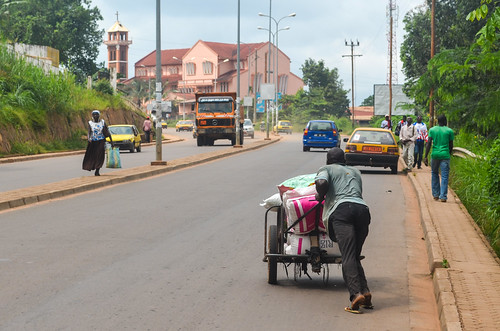
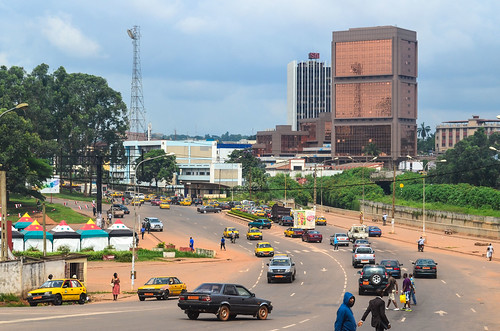
We were warned that Gabon doesn’t give visas easily. We are ready to struggle, having printed all sorts of documents, that I had already prepared for the Nigerian visa. We don’t arrive too late at the Embassy of Gabon, but the small queue grows quickly. The next one to seat with the almighty simple-minded lady, who validates and collects the application files, is simply the fastest applicant to jump on the chair as soon as it is freed. Wearing a suit or sport clothes doesn’t matter. Local applicants joke that it is easier to apply for a visa to Europe.
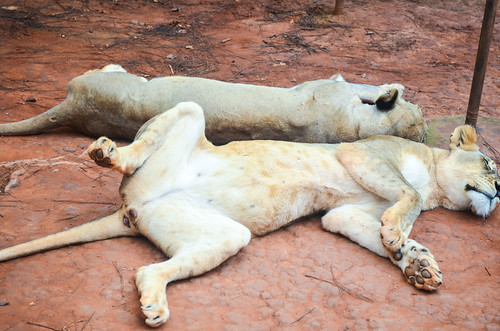
We don’t have the required hotel booking, and the lady replies with yes or no for the same question, depending which words we use to formulate it. Eventually, we manage to submit our application (with the extra express fee, 20’000 CFA on the top of the initial 50’000) with the promise that we will bring the hotel booking the next day.
Three hours later, we finally get out. The next day, we collect it successfully. It is a biometric visa (it just means my photo is printed on it) and the sticker says “VOYAGE TRANS AFRICAIN A VELO”, as I had written on the application form. Yay! We give a print-out of the hotel reservation from hotels.com. This requirement is a nonsense as very few hotels of these countries can be reserved online, and it’s only the luxury ones. In Gabon, they are all in Libreville and from 100 USD per night. But the reservation cancellation is free, so it is perfect for a visa application.
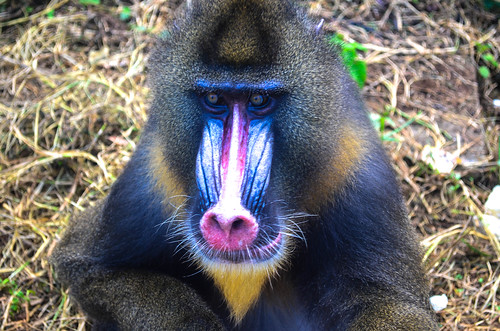
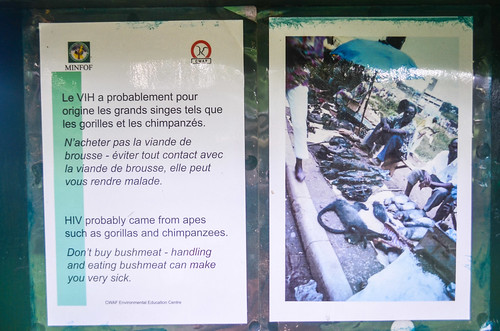
“Is it the same hotel that the one you wrote in the application form?“, she asks. It is not. We had written names of hotels that can’t be booked online. But we already have the visas in our passports. “Because if it is not the same hotel, it won’t work“. Then we reply it is the same hotel and we leave. I doubt they are that organized to block us at the border for wrong declarations. Usually, when the visa is printed in the passport, it’s all good, regardless of the lies used to get it.
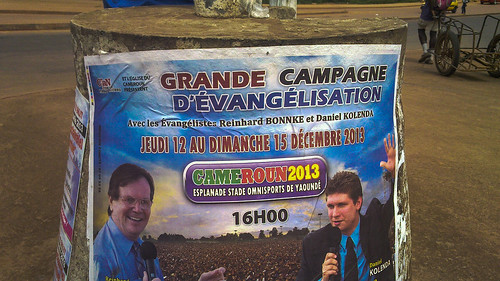
The Embassy of Congo is nearby. It is confusing to have two countries with the same name. Congo (Republic of) is the small Congo, the Congo-Brazza. Congo (Democratic Republic of) is the big one, the Congo-Kinshasa. In practise, Congo refers to the small Congo while the big one is called DR Congo, DRC, RDC, or even easier for everyone, Zaire.

The Congolese tourist visa is easy to get, but is limited to 15 days. The Embassy secretary says we can extend it once in Congo, and the security manager says we can get a 90-day visa here with the help of an invitation letter. It is not sure if any of them can be trusted, but as I read it’s smoother at their embassy in Gabon (all the embassies in Yaoundé are actually rather complicated), we forget about it for now.
There is another intriguing country in the region, squeezed on the coast between Cameroon and Gabon: Equatorial Guinea. The former Spanish colony is the third Guinea of Africa. It is very small, has a population under 1 million and could be crossed in a day, but the visa is said to be close to impossible to get (except for US citizens): 200ish USD, must arrive at the airport, etc. I also heard that photos are forbidden there and that foreigners are followed by the secret services, as the “president” is always afraid of coup d’état.
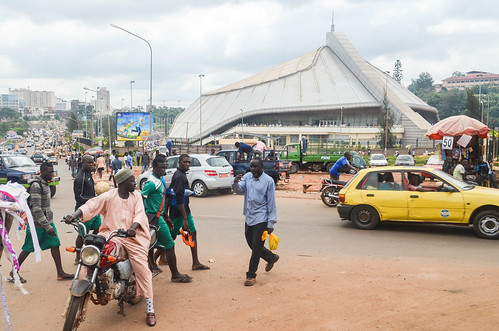
The president himself came to power with a coup, overthrowing his uncle. Teodoro Obiang has been controlling Equatorial Guinea for 34 years, during which oil has been discovered and made the country the richest of Africa: the GDP per capita is 25’000 USD (more than South Korea, Taiwan, Greece, Portugal, for example). The important detail is that the population barely lives more comfortably than in the neighboring countries. On the other hand, there is a short list of the assets [forbes] [the independent] [fr] owned by son of the president, also vice-president and minister. Even when knowing how wealthy African leaders can be, his lifestyle and shameless behavior in front of Guineans is unbelievable. Did he even wonder how will he drive those 26 luxury cars in a country that has no paved roads?
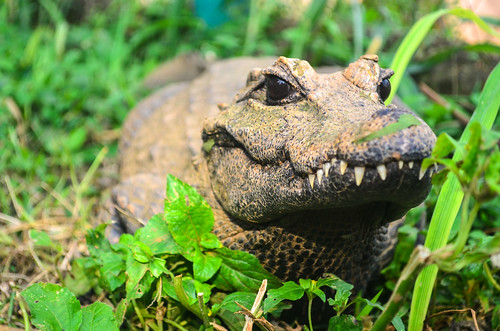
Equatorial Guinea is also member of the CEMAC zone. The free movement of people being implemented on January 1st, 2014. The country will close its borders on December 31st at midnight, fearing a massive immigration from Cameroonians. It is the third largest oil exporter of Africa after Nigeria and Angola. Oil generates 95% of the income of the small nation.
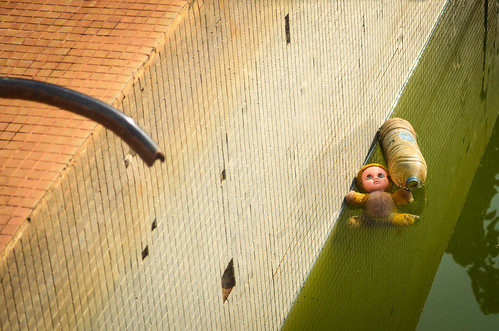
The Embassy of Equatorial Guinea in Yaoundé issues visa only for residents of Cameroon, and we don’t push hard to get one. Instead, I am more in need of pages in my passport: I have left Europe with a 36-page blank passport, and it is almost full. If I cannot get a visa because I have no more blank pages in my passport, then I can’t travel further. Africa is very page-consuming: now that Senegal asks for a visa for French citizens, there are only 3 visa-free countries on my route: Morocco, Namibia and South Africa.
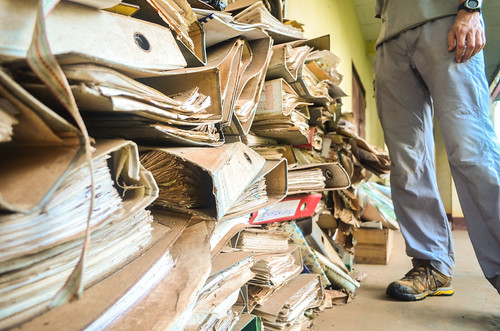
The problem is that to renew my passport while being abroad, I must stay for 3 weeks near a French Embassy, to apply and receive my new passport. It cannot be sent to an embassy of another country. This is very annoying, because I simply cannot wait that long in countries where my stay is limited by tourist visas. The French Embassy in Yaoundé has a huge residence in the south of the city, far away from the rest of the embassies in the north. But we can’t say we are really welcome inside. In the end, I go for the only solution where I have the control over what is happening: I keep my passport and I must instruct every embassy and immigration officer, from Cameroon until South Africa, to place their visas and stamps exactly where I want. This way, I can spare the empty pages for the visas and force the border officials to squeeze stamps my passport on pages already filled. I start this by sticking the four remaining empty pages together to preserve them from stamps, and zealous officers who enjoy writing their name and signing my passport.
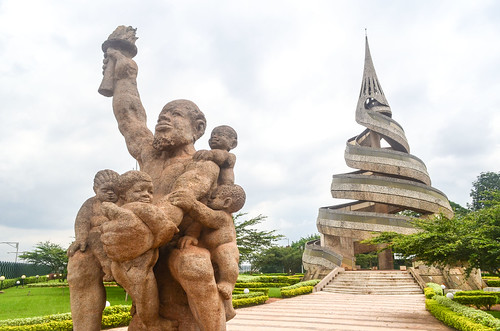
We find in Yaoundé, for the first time, fresh fruit juice, with corossols and papayas (made by Sudanese immigrants saying the Cameroonian character is difficult to work/live with). It is disappointing that, in a country where any tropical fruit grows, the only juices available are Fanta and super chemical juices. The poor transportation infrastructure doesn’t help to develop any local business. We also find pizzas, the magic food of the “i-am-out-of-the-bush-give-me-non-african-food” moments. But we cannot find spare tubes!
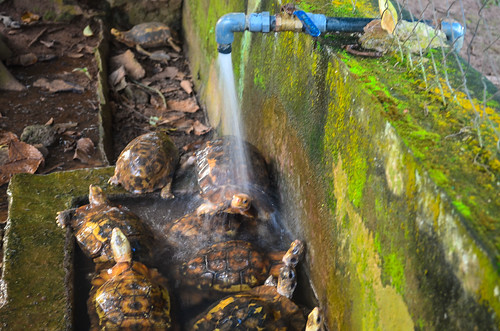
In Yaoundé, the citysport shop, the Decathlon-like chain of Africa, is very small. This shop in Dakar had everything, plus a skilled technician. The big citysport in Cameroon is in Douala, while Yaoundé only inherits a small one. There is not what I look for, the very common mountain bike 26″ x 2.00 tubes. No success at motorbike shops either. Unlike the rest of West Africa, people barely use bicycles in Cameroon. There are almost no bicycle repair workshops. A street workshop gives me the phone number of Jean-Pierre, the technician of the Cameroonian cyclist team, as I understood. And he appears to be the best contact in town: he has at home a spare room filled with good quality gear! He has Schwalbe, Michelin, Shimano … brands that would never sell in Africa because people will always buy the Chinese equivalent for five times cheaper. However, it is mostly second-hand stuff that friends bring him from Europe. So we must patch some tubes. I never thought that finding spare tubes would be that hard.
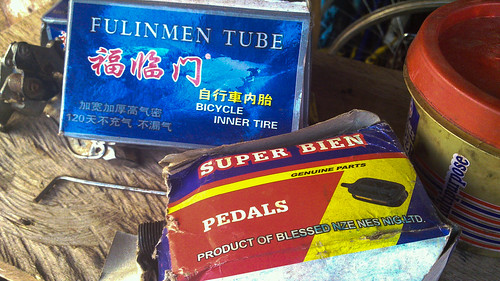

I had this pending task since I entered Cameroon, that I finally complete in town: changing my CFA Francs from XOF (West Africa) to XAF (Central Africa). I wrote earlier about the difference between the two currencies, even if 1€ always equals 655 XOF =655 XAF. The changers of Yaoundé prefer to sell XAF but charge you when you sell XOF. Muslims (they are usually the money changers in any large African city) are much smarter at the arguing and bargaining game, that after several trials, I finally find a non-Muslim and manage to swap my 75’000 CFA from one type to the other losing only 1000 in the change.
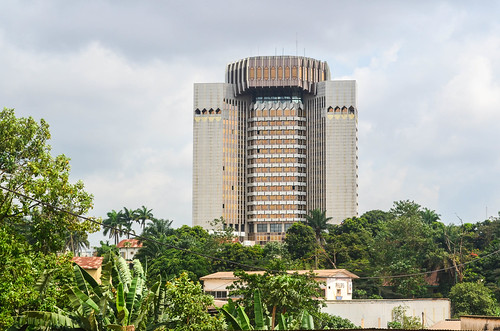
Overall, those few days in Yaoundé have been rather frustrating. In the neighborhood, it was never possible to enjoy electricity, water and phone network at the same time. There was always a problem. The water would cut just in the middle of doing a laundry. Then the electricity is off when my battery is dead. It has also been raining quite a lot. The internet cafés have been disconnected for days because of problems with the main providers, so I leave the capital city with a lot of unpublished photos.
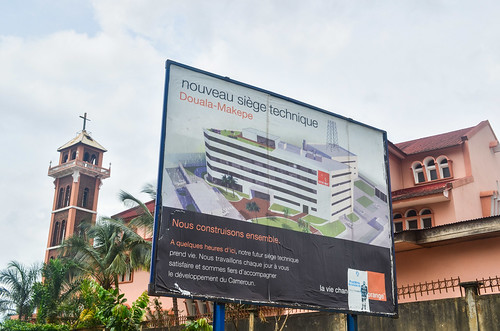

The strong rain during our last night in Yaoundé makes me wonder if the dry season is broken here. Like everything else. “C’est gâté” is a common and practical answer to explain something doesn’t work but it’s nobody’s fault (and nobody’s responsibility to set it up again). However, regarding the “broken rainy season”, everyone we talk to has the same explanation: global warming. Global warming is messing up the routine of the African rainy seasons.
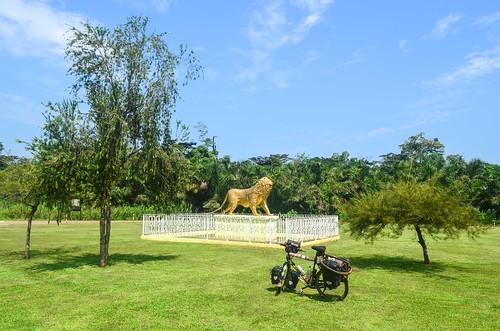
We visit Jean-Pierre a second time to get another spare tube in exchange of the new 3-speed chainring that I cannot use anyway. Leaving the city rather late, we cycle fast on the good road, but without any special sight.
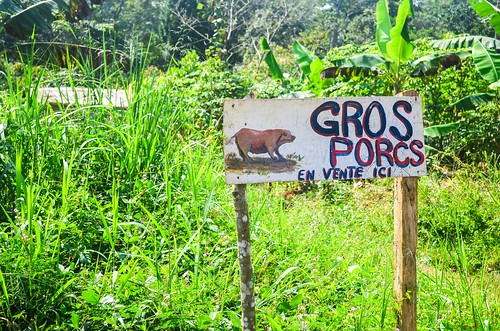
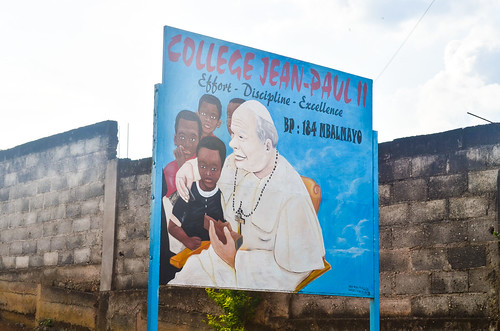
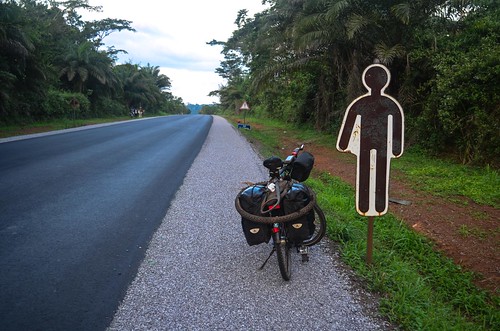
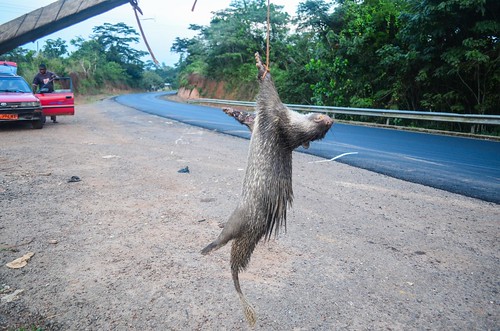
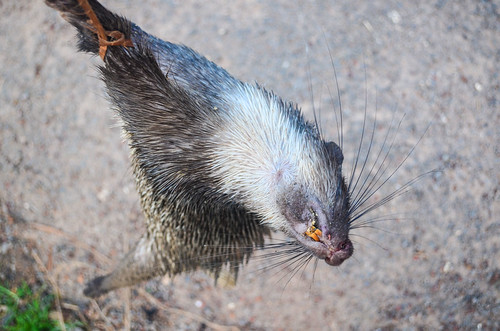
We shelter for the night under the porch of a school.
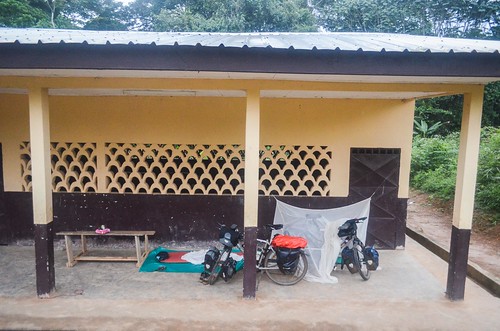
The road is brand new almost everywhere. At the end of some road works, we realize that the new layer of asphalt is laid just over a former layer, that doesn’t look so bad. Well, there are no potholes on this former layer, so we can reasonably say that it is one of the best roads of the country already. Then, why a new layer of asphalt? Especially when so many other roads, with more traffic, have only mud, or at best laterite.

A local gives us the explanation, which we could have guessed easily. The hometown of Paul Biya, the president of Cameroon since 1982, almost as good as Equato-Guinea’s Obiang (it is like if Ronald Reagan and Giscard d’Estaing were still presidents today), is located near Sangmélima, reachable by this very same road. Since his mandate is coming to an end, it is kind of an unnecessary gift to his native region that he is making.
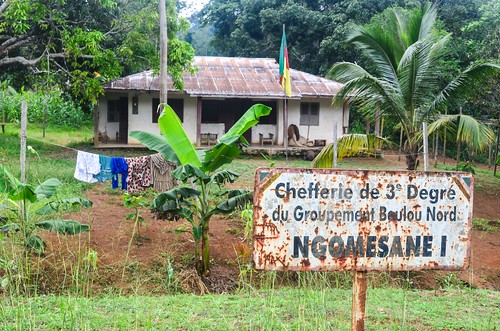

The rainy season is completely different once in the south of Yaoundé. From Senegal until now, the year has always been divided into two seasons: the dry season (roughly during the European winter) and the rainy season (roughly during the European summer). Depending on the country, the length of the seasons can vary.
I entered the rainy season in June in Sierra Leone and I left it in October in Nigeria. It actually didn’t rain much. I thought that from now on, I would be in the dry season until the rest of my trip, but it is not the case. The south of Cameroon has already a climate where the rains are scattered throughout the year.
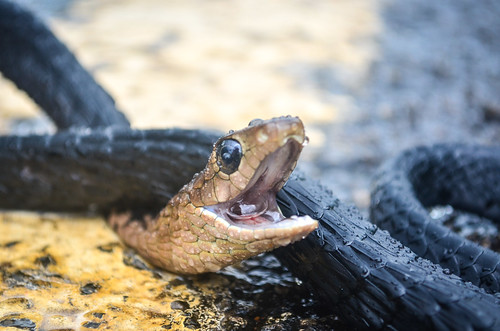
Ebolowa is the large town in southern Cameroon. We just stop for a big bowl of couscous manioc (soft fufu) with a delicious sauce while the rain passes, and get on the saddle again for a road that is more and more surrounded by the jungle.

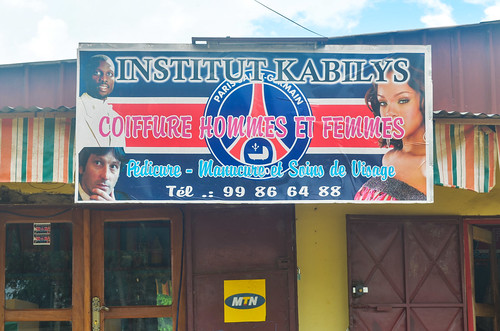

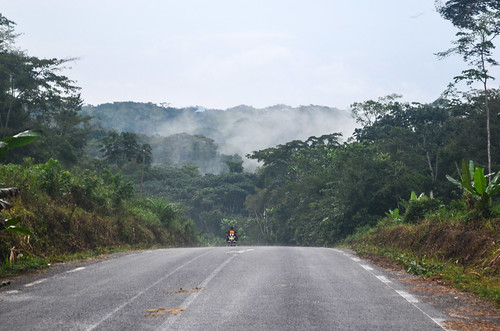
We reach Mefoup for the night, proud hometown of Nicolas N’Koulou, football player in Marseille.
We are welcomed by Achille who lets us sleep at the empty but brand new health center, built thanks to the donation of the senator who has a huge house nearby. And apparently, so as to treat malaria, some of the medicines I have are not good anymore. The Coartem tablet I carry since Senegal is banned by the ministry of health of Cameroon, who recommends to use Malacure instead.
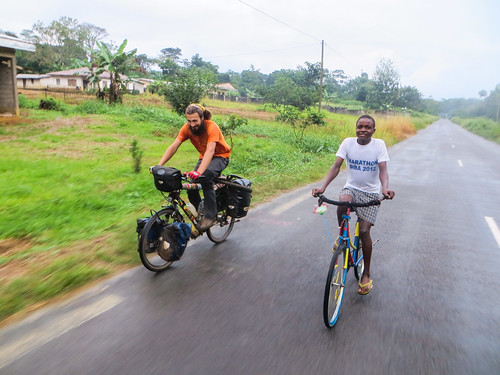
Our host says it is easy to go to Gabon and difficult to enter Equatorial Guinea. But since he is from the same ethnic group, he can pass. It is often, if not systematic, that the international borders have been drawn over the lands of large ethnic groups, who became theoretically separated. In practice, the difference of nationality on the ID doesn’t matter that much, and people travel freely to meet family members who live across the border.
We leave with the morning drizzle, with a good feeling that it will stop as soon as we pass the next hill. Beforehand, we have our breakfast, bread-butter-chocolate paste, a classic. Many of the tiny shops have bread and two buckets of 2 L or 5 L for butter and fake Nutella. One just has to ask for a “pain avec le chargement”.
While eating, the crowd of a dozen men is drinking at the same shop, the only shop of Mefoup. It is 8 am. They claim they must drink before going to the fields, so as to get motivation and energy. They try to get us to buy them bottle of “vuvuzela”, the 95% alcohol, praising the benefits of this cheap poison: “it is so good for the body it is allowed for pregnant women“.
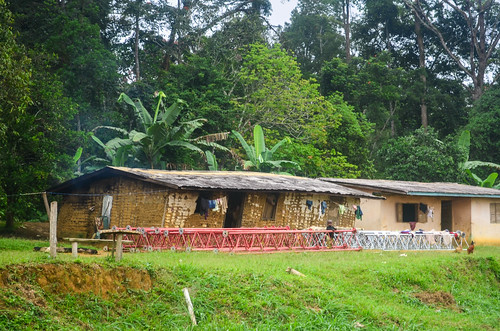
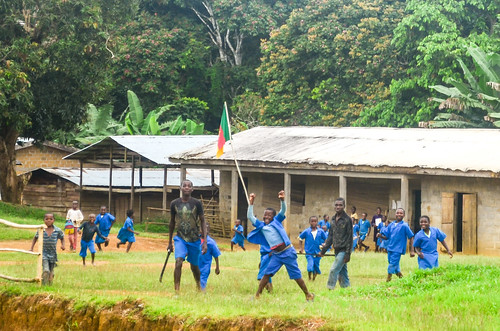
The more we ride, and the more we pass through small villages, where all the men are getting drunk at the small shop. They “drink before going to the fields”, as they say, but as time passes, 9 am, 10 am, 11 am … the small shop of each village has still its crowd of men “about to go to the fields”.
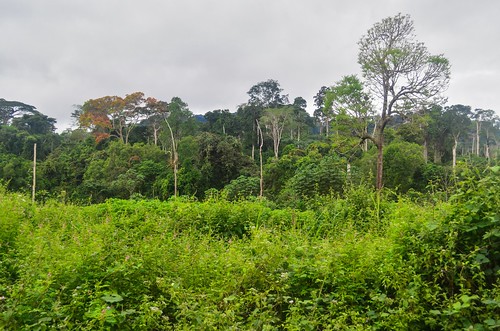

We reach the last large town before Gabon, Ambam, and I need to refill my petrol canister. I usually burn the sans-plomb, the usual unleaded petrol. This time, I try what is called “petrole” and twice cheaper than the one for motorbikes. It is said to be the pétrole lampant (lamping oil) used in kerosene lamps, as in the lampe-tempête we see a lot in villages that don’t have electricity.
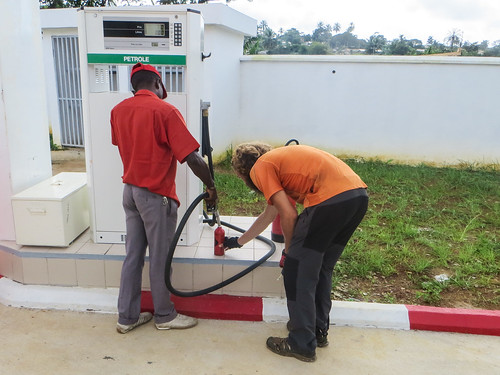
The names of fuels are very confusing. The French, US and UK names are all different and tricky. “Kerosene” in the US isn’t the same kérosene in French. Petrol station staff don’t know if there is lead or not in the fuel they sell. Every fuel can burn, but some are for generators, some for lamps, and I want one that burn well in my stove.
I want to try to light up this lamping oil somewhere, to see how it burns. I ask the staff where I can go and make my test burn. “Just here“, they answer. They allow me to pour some fuel on the floor of the brand new Total station and use my lighter. Safety rules have a long way to go here …

The people of the region are Ntoung. They say “ntam” for white, and we can use “nsut” for black. I find the people in the south of Ebolowa nicer than in the center of the country. They are actually greeting us and not just shouting “Wat wat wat ! ha ha ha ha“. Many houses have gardens nicely maintained. The road is still good and electricity is everywhere. This is very different from the two anglophone regions of Cameroon.

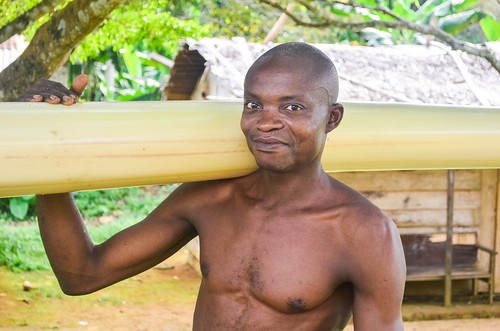
The trunk of the banana tree is used to make strings to tie the baton de manioc, the stick of pounded kassava.
The Eking border, exit of Cameroon, is just after the marché mondial of Abang Minko’o, a marketplace for Cameroonians, Gabonese and Equato-Guineans to exchange their goods. It is almost where the three countries meet. It happens on Cameroonian land most likely because the two other countries are too rich to allow Cameroonians on their territory. And also because Cameroon seems to produce everything that is eaten by the other two.

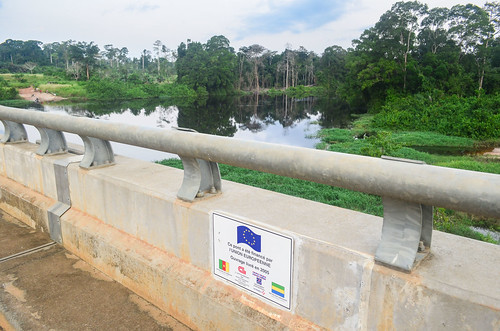

The border post in Gabon is smooth but not really friendly. Although we have already a valid visa, we are asked our itinerary, where we sleep, etc. The officers are quite rigid. It seems good that we got the visa beforehand, as usual.
We have to fill in forms, but we can’t get our passport stamped. “It is not here, it is in Bitam“. Bitam is 30 km further, and we have no chance to reach it before the night. But it is not a problem, we will visit the immigration office of Bitam tomorrow. Thus, we continue riding until the evening in Gabon, without our passport mentioning anything.
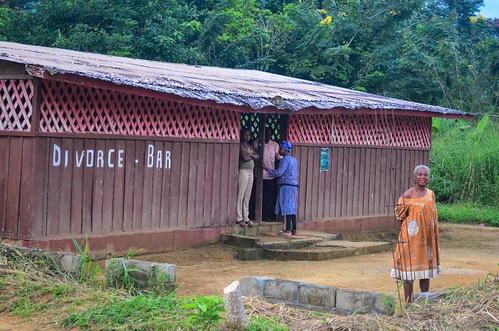
We stop in Nkolmengua, very close to the border. There is a very bad motel there, where the lady can’t stop talking about the Gabonese. It is perfect to give us prejudices in our new country, of which we barely know anything. The people of this northern region of Gabon, the Woleu-Ntem, are the same as in southern Cameroon. They are called Fang here and Ntoung there.
She says the Gabonese are lazy and produce nothing. They are supposedly paid by the government to do nothing. It wouldn’t surprise me, as Gabon is an oil rich country. She adds that all the food is imported, all the fresh food is imported from Cameroon. She wrongly claims that the population is Gabon is 10 million, among which 9 millions are Whites and West Africans. The real numbers are much smaller, but still astounding: the population of Gabon is 1.5 M, on a land half the size of France. It is estimated that a third of the population are foreigners. Mostly West Africans. The residence permit costs 50’000 CFA for French nationals and 600’000 CFA for Cameroonians (900 €, a huge sum for a permit valid only for 2 years). She also says that it is free for the Chinese…





Bonjour, merci beaucoup pour votre récit de voyage. Par ailleurs, je voulais juste vous poser une question concernant la route Yaoundé Mbalmayo. N’est-elle pas trop risquée ? Cycliste débutante étant en ce moment sur Yaoundé. Merci
Salut Nelly!
C’est très dur de répondre sans etre sur place, la situation sur la sécurité peut changer rapidement. Je te conseille de demander aux personnes qui habitent dans la region, ou mieux aux cyclistes ! Il semblerait que Whatsapp est utile ces joiurs-ci, il y a qq liens sur https://wobblyride.com/2023/06/06/pedalling-together-the-best-bicycle-touring-groups-and-forums-to-connect-with-fellow-cyclists/